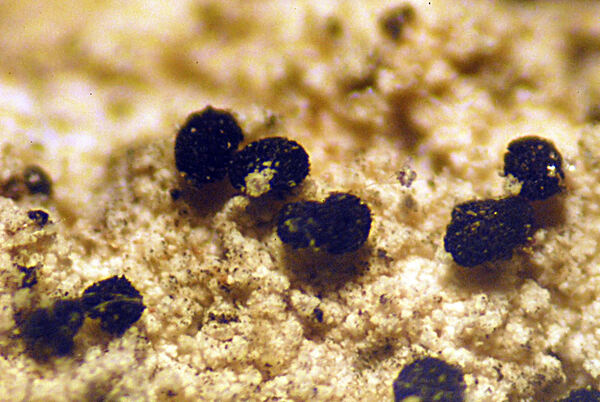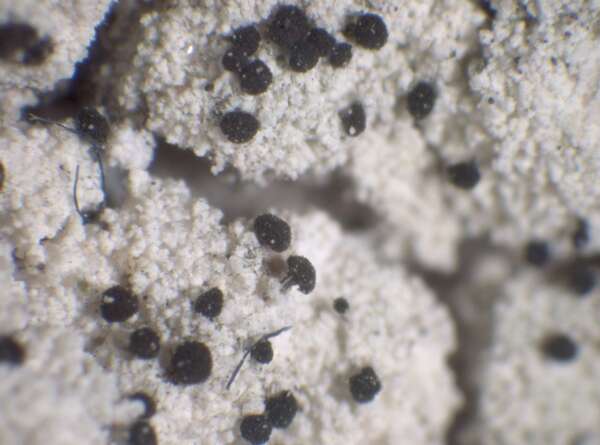Chaenothecopsis subparoica (Nyl.) Tibell
in Tibell & Ryman, Nova Hedwigia, 60: 215, 1995. Basionym: Calicium subparoicum Nyl. - Herb. Mus. Fenn.: 78, 1859.
Synonyms:
Description: Thallus not evident, not lichenized, parasitic on crustose lichens. Apothecia short-stalked, 0.2-0.3 mm high, solitary or in clusters of up to 7-8, the stalk 0.06-0.08 mm thick, black, in central part formed by pale brown to yellowish, mostly periclinally arranged hyphae, in outer part consisting of strongly sclerotized and intertwined hyphae. Capitulum black, hemispherical to lenticular, 0.2-0.3 mm across; mazaedium, absent. Exciple consisting of 2-3 layers of dark aeruginose hyphae; epithecium dark brown; hypothecium pale yellowish brown, of thin-walled cells with an irregular shape. Asci 8-spored, cylindrical, with a thickened apex penetrated by a narrow canal, formed singly, persisting until the spores are mature, with 1-seriately arranged spores. Ascospores 1-septate, brown, ellipsoid, 7-8 x 2.5-4 µm, with a thick, dark septum and a minute, irregular ornamentation. Photobiont absent. Spot tests: all parts of ascocarps K-, C-, KC-, P-, N-. Chemistry: without lichen substances.
Growth form: Lichenicolous fungus
Substrata: rocks
Reproductive strategy: mainly sexual
Most common in areas with a humid-warm climate (e.g. most of Tyrrenian Italy)
In underhangs rarely wetted by rain
paras Haematomma ochroleucum s.lat. and Tephromela grumosa
Commonnes-rarity: (info)
Alpine belt: absent
Subalpine belt: absent
Montane belt: absent
Dry submediterranean belt: very rare
Humid submediterranean belt: very rare
Padanian area: absent
pH of the substrata:
1 2 3 4 5
Solar irradiation:
1 2 3 4 5
Aridity:
1 2 3 4 5
Eutrophication:
1 2 3 4 5
Poleotolerance:
0 1 2 3
Altitudinal distribution:
1 2 3 4 5 6
Rarity
absent
extremely rare
very rare
rare
rather rare
rather common
common
very common
extremely common
Loading data...
Occurrence data
Predictive map
Growth form: Lichenicolous fungus
Substrata: rocks
Reproductive strategy: mainly sexual
Most common in areas with a humid-warm climate (e.g. most of Tyrrenian Italy)
In underhangs rarely wetted by rain
paras Haematomma ochroleucum s.lat. and Tephromela grumosa
Commonnes-rarity: (info)
Alpine belt: absent
Subalpine belt: absent
Montane belt: absent
Dry submediterranean belt: very rare
Humid submediterranean belt: very rare
Padanian area: absent
pH of the substrata:
| 1 | 2 | 3 | 4 | 5 |
Solar irradiation:
| 1 | 2 | 3 | 4 | 5 |
Aridity:
| 1 | 2 | 3 | 4 | 5 |
Eutrophication:
| 1 | 2 | 3 | 4 | 5 |
Poleotolerance:
| 0 | 1 | 2 | 3 |
Altitudinal distribution:
| 1 | 2 | 3 | 4 | 5 | 6 |
Rarity
absent
extremely rare
very rare
rare
rather rare
rather common
common
very common
extremely common
Loading data...
Occurrence data
Predictive map








